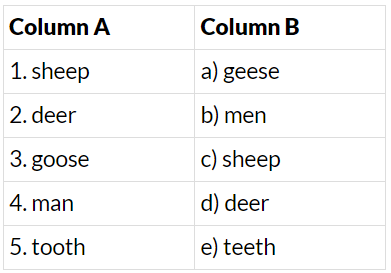Noun Class 6 Worksheet English Grammar
Section - A
Q.1. Choose the correct option.
(i) Which of the following is a common noun?
(a) John
(b) teacher
(c) Monday
(d) Ganges
Correct Answer is Option (b)
(ii) Which of the following is a proper noun?
(a) cat
(b) city
(c) New York
(d) fruit
Correct Answer is Option (c)
(iii) Which of the following is an abstract noun?
(a) book
(b) chair
(c) honesty
(d) river
Correct Answer is Option (c)
(iv) Which of the following is a collective noun?
(a) crowd
(b) table
(c) dog
(d) idea
Correct Answer is Option (a)
(v) Which of the following is the plural form of "child"?
(a) childs
(b) children
(c) childes
(d) childeren
Correct Answer is Option (b)
Section - B
Q.2. Answer the following questions.
(i) Define a noun and give an example.
A noun is a word that represents a person, place, thing, or idea. Example: dog, city, love.
(ii) What are proper nouns? Give two examples.
Proper nouns are specific names of people, places, or things. Examples: John, Paris.
(iii) What is the difference between countable and uncountable nouns? Give examples.
Countable nouns can be counted and have both singular and plural forms. Examples: cat, cats. Uncountable nouns cannot be counted and do not have plural forms. Examples: water, milk.
(iv) What is a collective noun? Give an example.
A collective noun is a word that represents a group or collection of people, animals, or things. Example: a herd of cows.
(v) Explain the concept of noun genders with examples.
Noun genders are classifications of nouns based on the sex of the person or animal it represents. Examples: male (man, boy), female (woman, girl), common (teacher, parent), and neuter (table, book).
Section - C
Q.3. Fill in the blanks: Complete the following sentences using the correct form of the noun given in the brackets.
(i) The ________ were playing in the park. (child)
Children
(ii) The ________ of books was too heavy to carry. (pile)
Pile
(iii) The ________ of lions was hunting for food. (pride)
Pride
(v) The ________ of the story teaches us a lesson. (moral)
Moral
(vi) There are several ________ of the word. (meaning)
Meanings
Section - D
Q.4. Match the nouns given in Column A with their plural forms given in Column B.

1. c
2. d
3. a
4. b
5. e
Section - E
Q.5. Write "True" if the statement is correct and "False" if the statement is incorrect.
(i) All proper nouns begin with a capital letter. ______
True
(ii) Abstract nouns can be seen or touched. ______
False
(iii) Collective nouns refer to a group or collection of people, animals, or things. ______
True
(iv) The plural form of "mouse" is "mouses". ______
False
(v) The plural form of "city" is "cities". ______
True
Section - F
Q.6. Pick out the Nouns in the following sentences and say whether they are Proper, Common, Material, Collective or Abstract.
(i) Ornaments are made of gold and silver.
Common Noun: ornaments
Material Noun: gold, silver
(ii) Mumbai is a big city.
Proper Noun: Mumbai
Common Noun: city
(iii) Blindness is the greatest curse.
Abstract Noun: Blindness
(iv) This table is made of steel.
Common Noun: table
Material Noun: steel
(v) Wisdom is better than strength.
Abstract Noun: wisdom, strength
(vi) The team won the match.
Collective Noun: team
(vii) The case was decided by a bench of judges.
Collective Noun: bench
(viii) A soldier is respected for his bravery.
Common Noun: soldier
Abstract Noun: bravery
Q.7. Choose the correct answer to complete these sentences.
(i) There is (no/any) jam left in the jar.
There is no jam left in the jar.
(ii) Joe (must/much) have that book.
Joe must have that book.
(iii) Anchal can sit in the back of the car. There is (plenty of/ a large amount of) room back there.
Anchal can sit in the back of the car. There is plenty of room back there.
(iv) The gift package will arrive soon. Have (the/a little) patience.
The gift package will arrive soon. Have a little patience.
(v) I have a lot of (a lot of / a few) homework to finish by tomorrow.
I have a lot of homework to finish by tomorrow.
(vi) If you are going to the market, pick up (some/many) bread too, please.
If you are going to the market, pick up some bread too, please.
(vii) There are (few/little) tigers left in this national park.
There are few tigers left in this national park.
|
49 videos|349 docs|46 tests
|
FAQs on Noun Class 6 Worksheet English Grammar
| 1. What is a noun and why is it important in English grammar? |  |
| 2. Can you provide examples of different types of nouns? |  |
| 3. How do you identify a noun in a sentence? |  |
| 4. What is the difference between a countable and uncountable noun? |  |
| 5. How can I improve my use of nouns in writing? |  |

















